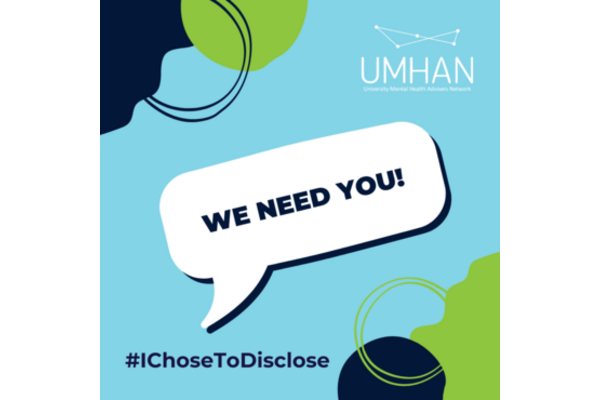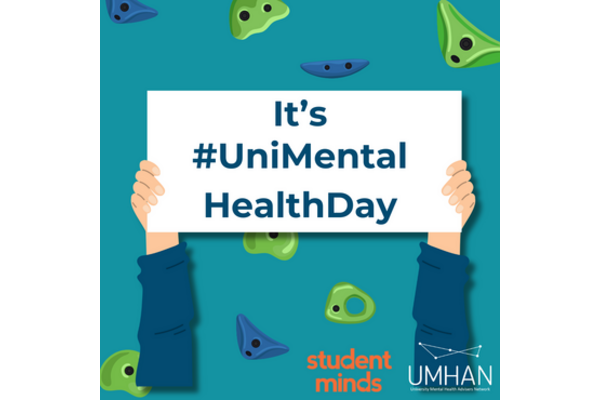Today, on the 16th Uni Mental Health Day, we are relaunching our I Chose To Disclose campaign. This campaign was first launched in 2017, the year before student Natasha Abrahart died by suicide. At that time there was a very different landscape, and there has been a huge increase in the numbers of students with mental health conditions disclosing to their education provider since then - either during the application process (UCAS, 2021) or during their period of study.
In society as a whole, awareness of mental health and wellbeing has increased, to such an extent that we are starting to see conversations about whether awareness campaigns are backfiring, in particular with their tendency to situate the cause and solution to mental health problems within the individual (Foulkes and Andrews, 2023).
Recent discussions and campaigning around whether universities should be subject to an increased Duty of Care have highlighted the public’s perception that Higher Education Providers (HEPs) need to do more. We’d argue HEPs and other education institutions are actually providing a huge and varied amount of support, although this varies from institution to institution depending on their resourcing. There can still be long waiting times for some non-urgent support, but mental health services have developed a range of processes and mechanisms to ensure students in crisis are now better identified and supported.
In many instances it is far easier and quicker to access support from student services than that provided by statutory services as we know from our recent survey of our members - and indeed many students would require little, if any, support from their HEP if statutory services were adequately resourced and able to meet demand. As with the rest of the NHS, the mental health workforce is struggling to recruit and retain enough staff, as shown by the latest workforce census by the Royal College of Psychiatrists which shows 963 vacant psychiatrist posts, a 32.6% increase on figures for 2021 (RC Psych 2024).
So why encourage more disclosures?
Student mental health is subject to the same social determinants as the rest of society, many of which are not in the control of HEPs. In some instances, students' mental health is made worth by the actions (or inactions) of the HEP itself. There are many ways students can be supported by their education provider - whether this is advice on a range of issues, flexibility with deadlines and assessments, safety planning or counselling.
In addition, HEPs can look at their own policies, practices and culture to examine their impact on the mental health and wellbeing of both staff and students, for example, through the University Mental Health Charter.
In terms of supporting individuals, services would always much rather work with students to avoid mental health deterioration if possible. But ultimately, we know that some students only disclose a mental health condition when they reach crisis point, and, sadly, some do not even reach out at that stage. Research has also shown that there are particular cohorts of students who are not reaching out for timely support such as international students, and male students.
There are, of course, multiple and often complex reasons for this, including the need for culturally competent support services, and making referral processes as easy as possible. UMHAN believes in ensuring students are aware of what their rights are in terms of accessing support, but also empowering them to have confidence to engage with the support available. This means making informed choices - understanding what support is available to whom, and how to access this. And, importantly, this also means they must trust that services are confidential within the context of safe practice.
The terms “Disabled” or “Disability” may not resonate with students with mental health conditions, and so they may not realise that the rights, services and provision of adjustments through the Equality Act 2010 apply to them. Many students arrive in Higher Education with no idea that they may be eligible for a package of support. It’s crucial that students are aware of what support may be available to them through Disabled Students’ Allowances, for example.
Reasonable adjustments, such as additional time in exams to help mitigate against concentration and fatigue issues, can be instrumental in ensuring that students with mental health conditions reach their full potential. Ideally, education as a whole would be more inclusive to avoid the need for students to disclose sensitive information to access more flexibility and student-centred practices, but the sector would need a radical overhaul to get to that point.
We know that UMHAN members and other staff working in student mental health have a hugely positive impact on many students, enabling them to thrive during their studies. Our I Chose To Disclose campaign aims to provide positive case studies of a wide range of students accessing advice and support.
Further discussions needed…
Not all students who are experiencing mental health problems need to formally disclose this to their education provider. Much of the support provided by HEPs is universal - open to all students and does not require sharing of information, as we detail in our For Students pages. It’s important that students understand when an issue like anxiety stops being a normal reaction to a stressful situation, and becomes a problem, and something they should seek further support for. It is a delicate line to balance between ensuring that specialist services are not overwhelmed whilst also making sure that vulnerable students are provided with prompt, appropriate support.
Our members are concerned that recent moves towards increased information sharing with trusted contacts will create more barriers to students reaching out for support when they most need it. Many members have told us that they have been uncomfortable with decisions to lower the thresholds to share information so that these are below what would be normal for the same-age cohort in a different setting. As suggested by a paper on this subject (Linton et al, 2022), there are already barriers to some groups of students opting-in to this kind of process and we feel more research needs to be done on this topic.
Conversations on the subject of student mental health both within the sector and more widely are currently focussed on the identification of risk and prevention of suicide. These are, of course, important conversations and a large part of the work of our trained practitioner members. But we also believe that risk taking is an important part of managing mental health and wellbeing - this is one of the key points of our Capability and Conduct Framework (which mirrors similar professional frameworks in the statutory sector). We can not encourage students to share information about a mental health condition within a climate of complete risk aversion, but in the knowledge that practitioners will respond appropriately and use their professional skill and judgement.
We know that many practitioner staff hold caseloads of high complexity and risk; with an under-resourced NHS, boundaries are becoming blurred between what universities, as education providers should be delivering in terms of mental health support, and what should be provided by statutory services. But expectations are high, from both students, parents and staff, to deliver tailored and individualised mental health support. Staff wellbeing needs to be as high on the agenda as student mental health to enable practitioners to be able to manage so many competing demands, while also dealing with complex situations within their caseloads.
There are fundamental issues that need addressing in society to really effectively improve student mental health and we refer you to our previous blog posts for Uni Mental Health Day.
Sam Gamblin
UMHAN Charity Manager









